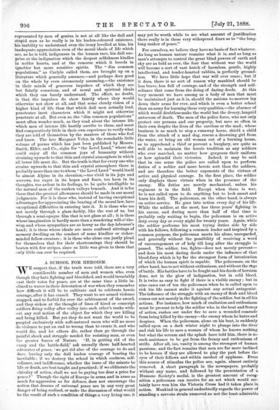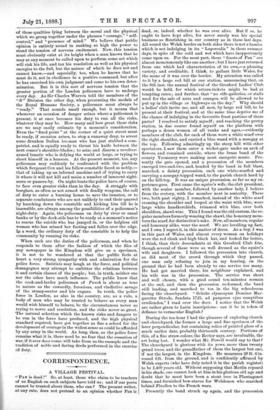A SCHOOL FOR HEROISM.
WE suspect that, if the truth were told, there are a very considerable number of men and women who, even though they hate fighting and bloodshed, and would invariably cast their votes for peace, are at the same time a little in- clined to waver in their detestation of war when they remember how difficult it will be to cultivate and to celebrate heroic courage, after it has ceased. They want to see armed violence stopped, and to forbid for ever the arbitrament of the sword, and they sicken at the thought of lines of hired or conscript soldiers firing volley after volley into each other's ranks with- out any real notion of the object for which they are killing and being killed. But yet they do not want the world to be peopled exclusively with soft-natured races who will no more do violence to put an end to wrong than to create it, and who would die, and let others die, rather than go through the painful shock and struggle needed for resisting man, or even
the greater forces of Nature. If, in getting rid of the camp and the battle-field,' ask uneasily these half-hearted advocates of peace, we get rid also of the courage to do and dare, leaving only the dull leaden courage of bearing the inevitable ; if we destroy the school in which coolness, self- reliance, and indifference, whether the issue of the minute be life or death, are best taught and practised ; if we obliterate the chivalry of action, shall we not be paying too dear a price for peace P Though the sight of Europe in arms, and in arms as much for aggression as for defence, does not encourage the notion that dreams of universal peace are in any very great danger of being realised, or make the discussion of what would be the result of such a condition of things a very living one, it may yet be worth while to see what amount of justification there really is in these very widespread fears as to "the long, long canker of peace."
For ourselves, we believe they have no basis of fact whatever. As long as human nature remains what it is, and as long as man's attempts to control the great blind powers of earth and sky are as bold as ever, the fear that without war the world will become a sort of vast hutch of harmless, gentle, highly. intellectual, and tender-hearted rabbits, is perfectly ground- less. We have little hope that war will ever cease; but if it does, there is no sort of reason why mankind should be less brave, less full of courage, and of the strength and self- reliance that come from the doing of daring deeds. At this very moment we have among us a body of men that must be maintained just as it is, should the nations to-morrow lay down their arms for ever, and which is even a better school than an army for learning these very qualities,—the absence of which would doubtless make the world but the dreary, languid anteroom of death. The men of the police force, who not only protect our persons and our property, but save so often in their own despite the lives of the careless or the mad; whose business is as much to stop a runaway horse, shield a child from the attack of a mad dog, rescue a drowning girl from the water, or bring an old woman out of a burning house, as to apprehend• a thief or prevent a burglary, are quite as well able to maintain the heroic tradition as any soldiers who ever marched, no matter how gorgeous their uniform or how splendid their victories. Indeed, it may be said that in one sense the police are called upon to perform duties of a nobler and more heroic sort than the soldiers, and are therefore the better exponents of the virtues of active and physical courage. In the first place, the soldier only displays these virtues when in the presence of the enemy. His duties are merely mechanical, unless his regiment is in the field. Except when there is war, he is not called upon to do anything but to look smart and learn his drill. The policeman, on the other hand, is always on active service. He goes into action every day of his life. While the soldier, at the most, has three years' fighting in his career, and during more than half of that time is probably only waiting to begin, the policeman is on active duty every day or every night for twenty years. Again, while the soldier performs his most trying duties side by side with his fellows, following a common leader and inspired by a common purpose, the policeman meets his alone, unregarded and generally without the possibility of. receiving a word of encouragement or of help till long after the struggle is passed. The soldier, too, fights—does not merely prevent— and does his most daring deeds under the influence of that blood-fury which is by far the strongest form of intoxication of which the human spirit is capable. The policeman, on the other hand, has to act without enthusiasm, and without the rage of battle. His battles have to be fought and his deeds of heroism done, not in the glow • of indignation, but in cold blood. It is twice as easy to fight if there is a visible enemy ; but in nine cases out of ten the policeman, when he is called upon to risk his life cannot stake it against any actual antagonist. The influence of the straggle with an enemy of flesh and blood comes out not merely in the fighting of the soldier, but in all his actions. For instance, how much of exaltation and enthusiasm must be present to help the soldier who, in the heat and frenzy of action, rushes out under fire to save a wounded comrade from being killed by the enemy—the enemy whom he hates and despises. When the policeman, alone on his beat, is suddenly called upon on a dark winter night to plunge into the river and risk his life to save a woman of whom he knows nothing but what the scream and the splash have told him, there is no such assistance to be got from the frenzy and enthusiasm of strife. After all, too, vanity is among the strongest of human passions; and the fact remains that men are far more inclined to be heroes if they are allowed to play the part before the eyes of their fellows and within earshot of applause. From this source of stimulus the police are, again, almost entirely removed. A short paragraph in the newspapers, probably without any name, and followed by the presentation of a Humane Society's medal, is the greatest amount of recog- nition a policeman can receive for an act which would cer- tainly have won him the Victoria Cross had it taken plaCe in action. Mankind in.general undoubtedly regards the power of standing a nervous strain unmoved as not the least admirable IA those qualities lying between the -moral and the physical which we group together under the phrases "courage," "self- control," and " presence of mind." We believe that public opinion is entirely sound in ranking so high the power to stand the tension of nervous excitement. Now, this tension must obviously exist at its height when a man knows that he may at any moment be called upon to perform some act which will risk his life, and tax his resolution as well as his physical energies to the full, but the nature of which he does not and -cannot know,—and especially, too, when he knows that he must do it, not in obedience to a positive command, but after he has exercised his own judgment and come to his own deter- mination. But it is this sort of nervous tension that the greater portion of the London policemen have to undergo every day. As Sir Charles Warren told the members of the
S " Division the other day, when presenting the medals of the Royal Humane Society, a policeman must always be " ready." That .sounds small enough, but it means that whenever an occasion of danger arises where a policeman is present, it at once becomes his duty to run all the risks, -whatever they may be. How many and how great these risks are we may easily estimate by a moment's consideration. Even the " fixed point " at the corner of a quiet street must be ready, if occasion arises, to stop a runaway dray, to arrest some drunken Italian ice-man who has just stabbed a com- patriot, and is equally ready to thrust his knife between the next comer's shoulder-blades ; to seize and disarm a revolver- .armed lunatic who is defying the world at large, or trying to shoot himself in a hansom. At the present moment, too, any policeman may suddenly be confronted with the problem which Sergeant Cox and his fellow-constable faced so nobly,— that of taking up an infernal machine and of trying to carry It where it will not kill and maim a number of innocent sight- seers or passers-by. On night-beats the police have, of course, to face even greater risks than in the day. A struggle with burglars, as often as not armed with deadly weapons, the call of duty to enter a burning house to save the inmates, or to separate combatants who are not unlikely to end their quarrel by knocking down the constable and kicking him till he is insensible, are always among the possibilities of a policeman's night-duty. • Again, the policeman on duty by river or canal banks or by the dock-side has to be ready at a moment's notice to rescue the suicide who has jumped in, or the helpless old woman who has missed her footing and fallen over the edge. Ip a word, the ordinary duty of the constable is to help the community by running its risks.
When such are the duties of the policeman, and when he responds to them after the fashion of which the files of any newspaper in the Kingdom will give us a specimen, it is not to be wondered at that the public feels at heart a very strong sympathy with and admiration for the police force. Satirists may laugh at the force, and political demagogues may attempt to embitter the relations between it and certain classes of the people; but, in truth, neither one nor the other have much influence. The public know that -the cook-and-larder policeman of Punch is about as true to nature as the cowardly, ferocious, and vindictive savage of the stump-orator and his organs. In truth, the police force in London, as also in the country, are, as a rule, a body of men who may be trusted to behave as every man would wish himself to behave, be the circumstances never so trying to nerve and resolution, and the risks never so great. 'The natural selection which the known risks and dangers to be run in the force have produced, and the high physical standard required, have got together as fine a school for the development of courage in the widest sense as could be afforded by any army in the world. As long, then, as the police force remains what it is, there need be no fear that the cessation of war, if it ever does come, will take from us the example and the tradition of noble and daring deeds performed in the exercise of duty.



































 Previous page
Previous page